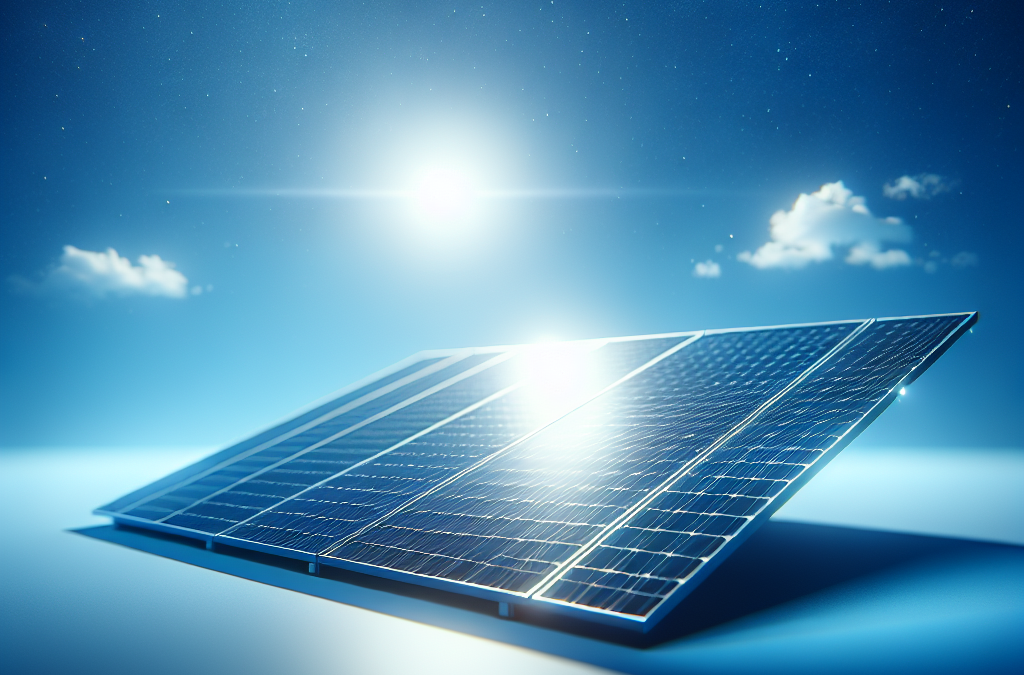So you’ve finally made the decision to go green and install solar panels on your home. It’s an exciting step towards renewable energy and lowering your carbon footprint. But as you prepare for this major change, an important question inevitably pops into your mind: Will you still receive those pesky utility bills after installing solar panels? After all, the whole point of going solar is to reduce your dependence on traditional electricity sources, right? In this article, we’ll explore the answer to this common concern and shed some light on what to expect once those panels are up and running.
Why Install Solar Panels?
Installing solar panels on your home or property comes with numerous benefits that make it a worthwhile investment. One major reason to install solar panels is the potential for reduced electricity costs. By generating your own electricity from the sun, you can significantly decrease your reliance on utility power and avoid the ever-increasing rates charged by utility companies. With solar panels, you can take control of your energy usage and save money in the long run.
Another important factor to consider when installing solar panels is their positive impact on the environment. Solar energy is a clean and renewable source of power that produces no greenhouse gas emissions or air pollutants. By switching to solar, you can do your part in reducing your carbon footprint and mitigating climate change. It’s a win-win situation: not only do you benefit financially, but you also contribute to a cleaner and greener planet for future generations.
In addition to cost savings and environmental benefits, solar panels have the potential to generate income. Through a process known as net metering, you can earn credits or even profit by selling excess electricity back to the grid. This means that during periods when your solar panels produce more electricity than you need, you can share the surplus with your utility company and receive compensation for it. By turning your solar panels into a small-scale power plant, you can potentially generate income and make your investment in solar panels even more financially lucrative.
How Solar Panels Work
Solar panels work by capturing sunlight and converting it into usable electricity. They are comprised of photovoltaic (PV) cells, which are typically made of silicon and other conductive materials. When sunlight hits these cells, it excites the electrons in the silicon, creating an electric current. This direct current (DC) is then converted into alternating current (AC) by an inverter, making it compatible for use in your home’s electrical system.
To maximize their efficiency, solar panels are typically mounted on rooftops or other areas with ample sunlight exposure. They are designed to absorb as much sunlight as possible throughout the day, converting it into usable electricity. Any excess electricity that is generated but not immediately used can be stored for later use, either in batteries or by sending it back to the grid for net metering purposes.
How Solar Panels Impact Utility Bills
One of the most noticeable impacts of installing solar panels is the decreased reliance on utility power. By generating your own electricity from solar energy, you can significantly reduce your dependence on the power supplied by utility companies. This ultimately translates into lower utility bills, as you will be using less electricity provided by the grid.
Furthermore, net metering is a program that allows solar panel owners to benefit financially from excess electricity generation. When your solar panels produce more electricity than your home requires, the surplus can be sent back to the grid. In return, you receive credits on your utility bill. These credits can offset the electricity you consume from the grid during periods when the sun isn’t shining as brightly, effectively reducing or even eliminating your monthly utility costs.
It’s important to note that the impact of solar panels on utility bills can vary depending on the type of system you have. Off-grid systems, for example, are not connected to the utility grid and rely solely on solar power and battery storage. This means you won’t receive any utility bills, but you will also need to manage your energy usage carefully to avoid running out of electricity. On the other hand, grid-tied systems are connected to the utility grid and allow for net metering, providing a balance between self-sufficiency and the benefits of being tied to the grid.
Understanding Net Metering
Net metering is a billing arrangement that allows solar panel owners to sell excess electricity back to the utility grid and receive credits for it. Under this system, any surplus electricity your solar panels generate is automatically fed into the grid, and you are credited for the value of that electricity. These credits are then used to offset your future electricity consumption from the grid.
The implementation and regulations surrounding net metering vary by location and utility company. Generally, the excess electricity you send back to the grid is valued at the retail rate, which is the same rate you pay for electricity when consuming from the grid. This means you can effectively “bank” your excess electricity and use it later when your solar panels aren’t producing enough power to meet your needs.
The net metering program offers a great incentive for solar panel owners, as it allows you to take full advantage of the electricity you generate. Not only does it reduce your reliance on the grid and lower your utility bills, but it also encourages the growth of renewable energy by compensating you for the clean electricity you provide to the grid.
Calculating Savings and Return on Investment
Before making the decision to install solar panels, it’s important to understand the financial aspects involved. The initial cost of solar panel installation can vary depending on factors such as the size of the system, the type of panels, and any additional equipment required. However, it’s important to note that the prices of solar panels have significantly decreased in recent years, making them a more affordable option for homeowners.
The most significant savings from solar panels come from the reduced electricity costs. By generating your own electricity and relying less on the grid, you can expect to see a substantial decrease in your monthly utility bills. The amount you save will depend on factors such as your energy consumption, the size and efficiency of your system, and the net metering program in your area.
Calculating the return on investment (ROI) for solar panels is a key consideration. The ROI timeframe is the period it takes for the savings from your reduced utility bills to equal or surpass the initial investment in solar panel installation. Several factors can affect the ROI timeframe, including the cost of your system, the amount of electricity you consume, and the incentives available in your area. Generally, homeowners can expect a payback period of around 5 to 10 years, after which they can enjoy significant savings on their electricity bills.
Additional Costs and Factors to Consider
While solar panels can bring significant financial and environmental benefits, there are additional costs and factors to consider when making the decision to install them. One factor is the ongoing maintenance and cleaning of the panels. Although solar panels are generally low-maintenance, they do require periodic cleaning to remove any dirt, debris, or snow that may accumulate and reduce their efficiency. This can be done by simply spraying them with water or using a soft brush.
Another factor to consider is the cost of battery storage. If you opt for an off-grid system or want to have backup power during grid outages, you will need to invest in batteries to store excess electricity for later use. These batteries can add to the overall cost of your solar panel system, so it’s important to factor this expense into your calculations.
Shading and positioning are also important considerations. To maximize the efficiency of your solar panels, it’s essential to position them in an area with maximum sunlight exposure throughout the day. Shading from trees, buildings, or other obstructions can significantly decrease the efficiency of your panels, leading to decreased electricity generation. It’s crucial to assess your property for any potential shading issues and make necessary adjustments or choose an alternative installation location.
Solar Energy Incentives and Tax Credits
To encourage the adoption of solar energy, governments and utility companies often offer various incentives and tax credits to help offset the initial costs of solar panel installation. The most notable incentive is the federal solar tax credit, also known as the Investment Tax Credit (ITC). This credit allows homeowners to deduct a portion of their solar panel system’s cost from their federal taxes. The percentage of the credit varies depending on the year, with a current credit rate of 26% for systems installed by the end of 2022.
In addition to the federal tax credit, many states and local jurisdictions offer their own incentives to further reduce the cost of solar panel installation. These incentives can include grants, rebates, and low-interest loans, which can significantly lower the upfront cost and accelerate the payback period of your solar panel system.
Another financial benefit of solar panel installation is the opportunity to earn Solar Renewable Energy Certificates (SRECs). SRECs are tradable certificates that represent the environmental attributes of one megawatt-hour of solar electricity generation. In certain states, solar panel owners can earn SRECs based on the amount of electricity their system produces and sell them to utilities or other entities obligated to meet renewable energy targets. This can provide an additional source of income and increase the overall financial return on investment.
Financial Implications and Payback Period
When considering the financial implications of installing solar panels, it’s important to look beyond the initial investment and consider the long-term savings and benefits. While the upfront cost may seem significant, the return on investment can be substantial over time.
The factors that affect the payback period of your solar panel system include the cost of installation, the amount of electricity you consume, the incentives available, and the rise in utility rates over time. By carefully calculating these factors, you can estimate the payback period and make an informed decision about whether solar panels are a worthwhile investment for you.
In the long run, solar panels can provide significant financial benefits. Once your solar panel system has paid for itself through savings on utility bills and potential income from net metering or SRECs, you can enjoy virtually free electricity for the remaining lifespan of your panels. This can result in substantial savings over the years and contribute to your financial stability and peace of mind.
The Role of Utility Companies
When installing solar panels, it’s essential to understand the relationship and communication with your utility company. Utility bill adjustments and credits are made possible through net metering programs, which allow solar panel owners to sell excess electricity back to the grid. The utility company acts as the intermediary between your solar panels and your energy consumption, ensuring accurate billing and compensation for the electricity you generate.
During the installation process, it’s important to inform your utility company about your plans to install solar panels. This way, you can ensure proper coordination and access to the required net metering arrangements. Utility companies often have specific guidelines and procedures for interconnecting solar panel systems to the grid, so it’s crucial to follow their instructions and stay in communication throughout the process.
In some cases, utility companies offer power purchase agreements (PPAs) as an alternative to traditional net metering. With a PPA, a third party owns and maintains the solar panel system, and you purchase the electricity it generates at a predetermined rate. While PPAs may have certain advantages, such as lower upfront costs and professional maintenance, they may not offer the same financial benefits as owning the solar panel system outright. It’s important to carefully assess the terms and conditions of a PPA before deciding on this alternative arrangement.
Conclusion
Installing solar panels can have a multitude of benefits for homeowners. From reduced electricity costs to a positive impact on the environment, solar panels offer a unique opportunity to take control of your energy usage and make a significant financial investment. By capturing sunlight and converting it into electricity, solar panels allow you to decrease your reliance on utility power and potentially even generate income by selling excess electricity back to the grid.
Understanding net metering and the financial implications of solar panel installation is key to making an informed decision. By calculating savings, estimating the return on investment, and considering additional factors such as maintenance, shading, and positioning, you can ensure that installing solar panels is a viable and worthwhile endeavor.
Incentives and tax credits further enhance the financial benefits of solar panel installation, making it more accessible and affordable for homeowners. By taking advantage of federal, state, and local incentives, you can significantly reduce the upfront cost and accelerate the payback period of your solar panel system.
Overall, installing solar panels empowers you to take control of your energy consumption and contribute to a more sustainable future. With the potential for decreased utility bills, positive environmental impact, and long-term financial benefits, solar panels provide a win-win solution for homeowners seeking energy independence and financial stability. So, why not consider installing solar panels and start enjoying the freedom and advantages they offer today?









